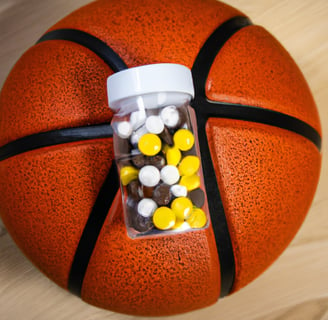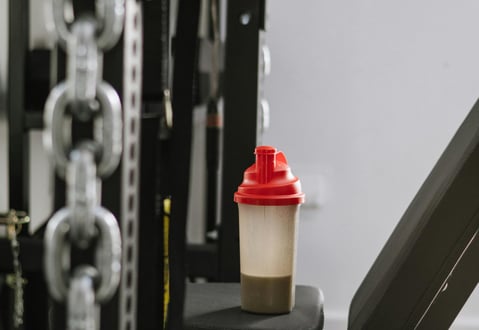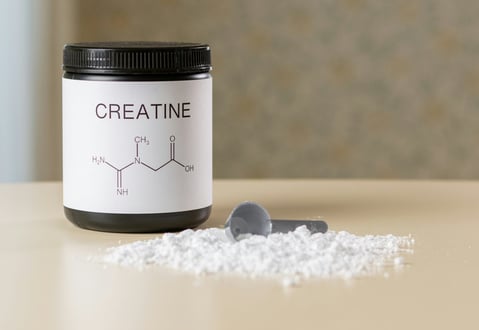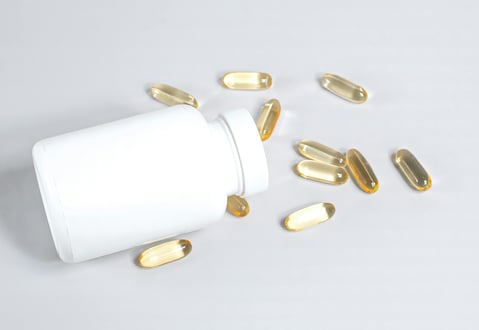What Supplements Should Basketball Players Take?
Learn what supplements I recommend for basketball players
SUPPLEMENTSNUTRITION
Eivydas Navasinskas
7/2/20246 min read


As a basketball player, maintaining optimal performance, recovery, and overall health is crucial. The right supplements can provide that extra edge on the court. Here’s a comprehensive guide to the best supplements for basketball players, based on insights from nutrition science and my personal experience.
Before You Buy... Here's What You MUST Know
Ensuring the quality of supplements is crucial, especially in today's world, where flashy marketing often overshadows actual efficacy. Many products do not contain the ingredients or amounts listed on their labels, and some include unsafe or illegal substances. For competitive athletes, consuming a tainted supplement can result in failed drug tests and career-ending consequences.
One reliable way to verify supplement quality is through third-party lab analysis. Reputable companies provide lab reports confirming their products contain the listed ingredients in the correct amounts and are free from harmful substances. Certifications like “Certified Drug Free,” “Certified for Sport,” or “Informed Choice” from organizations such as NSF International (NSF) are good indicators of quality. Additionally, using licensed ingredients from well-known suppliers, such as CreaPure for creatine monohydrate, ensures a higher standard of quality.
Be cautious of proprietary blends, which list a mix of ingredients without specifying dosages. This often hides underdosed, ineffective ingredients. Avoiding such products can prevent wasting money on supplements that don’t deliver promised benefits.
For example, protein spiking—adding cheaper amino acids or non-protein substances to inflate protein content—is a common deceptive practice in protein powders. Look out for red flags like unusually low prices, proprietary blends, and low leucine content to avoid low-quality products.
Resources like Examine.com offer valuable, research-based information on the validity and effectiveness of supplements. Sites like this help consumers make informed decisions based on scientific evidence rather than marketing hype.
Be cautious with new supplements, waiting for multiple studies to confirm their efficacy and safety before adding them to your regimen. This approach helps you avoid unproven or potentially harmful products, ensuring your supplementation supports your health and fitness goals safely and effectively.
Most proven and effective
Protein Supplements
Why Take It? Protein is essential for muscle repair and growth. Supplementing with protein can help ensure you meet your daily protein needs, especially important for muscle recovery after intense training and games. From experience, most athletes are NOT consuming optimal amounts (~1.6g/kg).
Benefits:
Supports muscle repair and growth.
Aids in recovery post-exercise.
Helps maintain muscle mass during periods of intense training.
How to Use:
1-2 portions a day (if you need to take more, your diet likely needs improvement).
Can be taken as shakes or protein bars as convenient sources.
Whey concentrate is a great choice. If it upsets your stomach, try whey isolate or hydrolysate.
If you prefer plant protein, soy protein or a 70:30 ratio of pea and rice protein are great alternatives to whey.


Creatine
Why Take It? Creatine is one of the most researched and effective supplements for athletes. It helps replenish ATP (adenosine triphosphate), the primary energy carrier in cells, allowing for enhanced performance during high-intensity activities like sprinting and jumping, which are common in basketball.
Benefits:
Increases muscle power and strength.
Enhances muscle growth and retention.
Supports improved performance in short bursts of high-intensity activity.
How to Use:
Take 0.04 g/kg daily.
Timing is not crucial. Just take it.
Although there are many different forms of creatine (malate, HCL, ethyl-ester, krealkalyn, etc.), none have proved to be better than monohydrate, which is the cheapest option.
It’s normal to gain ~3% of body weight when taking creatine monohydrate due to intramuscular water retention. This weight goes away within a week after stopping creatine.


Caffeine
Why Take It? Caffeine is a well-known performance enhancer that can improve focus, alertness, and endurance.
Benefits:
Increases alertness and reaction time.
Enhances endurance and reduces perceived exertion.
Improves overall athletic performance.
How to Use:
3 to 6 mg per kg of body weight, taken about 30 to 60 minutes before training.
Don’t take it in the evening.
Tolerance builds up quickly for caffeine, so use it sparingly (max 2x/week) and only on those days when you’re feeling low on energy.
It can produce side effects, so start with low doses and see how you feel.


Omega-3 Fatty Acids
Why Take It? Omega-3 fatty acids, particularly EPA and DHA, are important for reducing inflammation and supporting cardiovascular and brain health. Most people and athletes do not eat enough foods high in omega-3s (fatty fish, certain seeds, and nuts) to get an optimal amount.
Benefits:
Reduces inflammation and supports joint health.
Enhances cardiovascular and brain health.
Supports overall well-being.
How to Use:
1-2 grams per day of combined EPA and DHA (not just total omega-3).
Fish oil supplements are a common source, but make sure they are high quality to avoid rancidity.
Algae oil is a solid alternative if you don’t like fish oil.


Vitamin D
Why Take It? Vitamin D plays a crucial role in bone health, immune function, and muscle performance. Many athletes, especially those training indoors, may have suboptimal levels.
Benefits:
Supports bone health and reduces the risk of fractures.
Enhances muscle function and performance.
Boosts immune system function.
How to Use:
1000 to 4000 IU per day, but a blood test is highly recommended to determine the exact dosage. Aim to have your blood levels in the 75-125 mmol/L range.
Supplements that you likely need
Magnesium
Why Take It? Magnesium is an essential mineral that plays a critical role in numerous bodily functions, including muscle and nerve function, energy production, and bone health. For basketball players, maintaining adequate magnesium levels is crucial for optimal performance and recovery. Most athletes do not consume enough (400mg/day).
Benefits:
Supports muscle contraction and relaxation, helping to prevent cramps and spasms.
Involved in the conversion of food into energy, essential for sustaining high-intensity efforts during games and practices.
Contributes to bone density and strength, reducing the risk of fractures and injuries.
How to Use:
~300 mg per day.
Magnesium citrate, magnesium glycinate, and magnesium malate are well-absorbed forms. Take with food to enhance absorption and reduce the risk of stomach discomfort.
Supplements that you MAYBE benefit from
Multivitamins
Why Take It? A well-rounded multivitamin can help fill any potential nutrient gaps in your diet, ensuring you get all the essential vitamins and minerals needed for optimal health and performance.
Benefits:
Ensures adequate intake of essential vitamins and minerals.
Supports overall health and immune function.
Helps maintain energy levels and performance.
How to Use:
Follow the recommended dosage on the product label.
Don’t buy expensive “sport vitamins” as they are highly overdosed. Get a cheap option that provides 100% RDA for the majority of micronutrients.
Ideally, perform a blood test to see which vitamins and minerals you’re deficient in, to avoid consuming too much.
Beta-Alanine
Why Take It? Beta-alanine is an amino acid that helps buffer acid in muscles, slightly improving endurance and reducing fatigue during high-intensity activities.
Benefits:
Delays muscle fatigue.
Enhances endurance and performance during prolonged activities.
How to Use:
3-4 grams per day, usually taken in divided doses to minimize potential tingling sensations (paresthesia).
Timing isn’t important, take whenever you like it.
What About Other Supplements?
If they are not listed in the recommendations, it’s either they haven’t proved to be effective in research settings or they require a special scenario (e.g., a specific micronutrient deficiency) to be recommended. And yes, BCAAs are not worth your money, no matter how popular they are.
Which Supplement Brand Should I Choose?
I recommend sticking with big, well-established brands. Not to say that lesser-known brands are always bad or scammy, but the risk of getting “label mismatching ingredients” is higher compared to the bigger companies.
In the last few years, I and my athletes have mainly used My Protein. We have also tried Gym On protein powder, Ostrovit, and a few others.
My advice is to do some research and look at independent third-party lab analyses to see if the brand scores well on quality measures. If you can’t find it, email the company and ask for lab analysis results. Most good companies will do quality control and should provide evidence of the quality of their products.
Conclusion
While supplements can provide a boost to your performance and health, in the grand scheme of things, they play only a minor role. Getting enough calories, whole quality foods, and sufficient hydration will trump any fancy supplementation strategy every day of the week.
© COPYRIGHT 2023. ALL RIGHTS RESERVED.
Company
Contacts
Coaching Services
+37062449628
Vingis Park Stadium
Vilnius Athletic Manege
Vilnius
Lithuania
